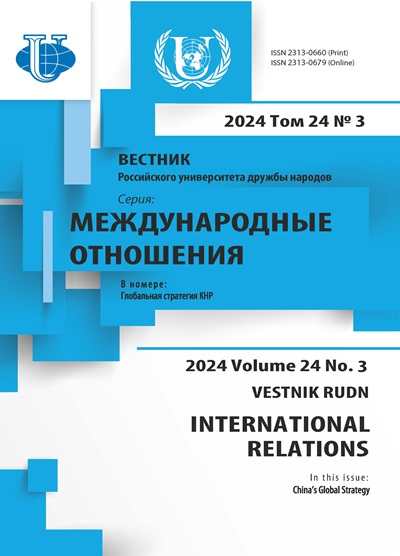Maghreb 2021: Political Development Impasses and Threats to the Subregional System
- Authors: Kuznetsov V.A.1, Vasilenko A.I.1
-
Affiliations:
- Primakov National Research Institute of World Economy and International Relations, Russian Academy of Sciences
- Issue: Vol 21, No 4 (2021): The Greater Mediterranean: Still Constructing the Macro-region
- Pages: 642-654
- Section: THEMATIC DOSSIER
- URL: https://journals.rudn.ru/international-relations/article/view/29811
- DOI: https://doi.org/10.22363/2313-0660-2021-21-4-642-654
Cite item
Full Text
Abstract
The article is devoted to the relevant issues of international relations in the Maghreb subregion, which became especially acute after the rupture of diplomatic relations between Algeria and Morocco in August 2021. The authors analyze the general parameters of the Maghreb subsystem of international relations and identify key trends in the internal political development of its member states. The growing tension in the bilateral relations between Algeria and Morocco is only a symptom of the general crisis of the regional subsystem. The study is based on the analysis of a wide array of information and analytical materials and documents, as well as the authors’ field research in the border regions of Morocco (2019) and Algeria (2018, 2019) and interviews with Maghreb politicians (2020, 2021). The first part of the article highlights the key parameters of the Maghreb subsystem, describes its internal architecture, reveals the interconnections with other regional subsystems, and identifies the development trends of the Maghreb that took shape in the 2010s. The second part analyzes the internal political dynamics in Libya, Tunisia and Algeria. The current situation in each country can be described as an impasse, both in terms of the development of the democratic process and the possibilities for national consolidation on an authoritarian basis. The political elites of the region are unable to offer realistic strategies for state development and it leads to the growing alienation of societies. The third part of the article reveals the implications of political development crises for the regional relations. The authors conclude by putting forward a scenario of a partial reorientation of a number of Maghreb states from a deeper Mediterranean integration to finding other allies. They also identify prospects for rebalancing relations of Maghreb states with their Arab partners. In the framework of these processes the elites can use conflicting foreign policy agenda for the national consolidation of some countries. Finally, the authors raise the question of seeking new models of state and regional development in the Maghreb.
About the authors
Vasily A. Kuznetsov
Primakov National Research Institute of World Economy and International Relations, Russian Academy of Sciences
Author for correspondence.
Email: vasiakuznets@yandex.ru
ORCID iD: 0000-0003-3646-4037
PhD (History), Leading Researcher, Center for the Middle East Studies
Moscow, Russian FederationAnastasia I. Vasilenko
Primakov National Research Institute of World Economy and International Relations, Russian Academy of Sciences
Email: avasilenkan@gmail.com
ORCID iD: 0000-0002-1027-6137
Junior Research Fellow, Center for the Middle East Studies
Moscow, Russian FederationReferences
- Bauman, Z. (1994). Controversy over postmodernism. Sociological Journal, (4), 69-80. (In Russian).
- Baranovsky, V. G. & Naumkin, V. V. (Eds.). (2018). The Middle East in the changing global context. Moscow: IV RAN publ. (In Russian).
- Vidyasova, M. F. (1987). Social structures of the pre-colonial Maghreb. Genesis and typology. Moscow: Nauka publ. (In Russian).
- Volodina, M. A. (2015). Algerian-Moroccan relations in the light of the Western Sahara conflict. Russia and the Muslim World, (10), 106-114. (In Russian).
- Zheltov, V. V., & Zheltov, M. V. (2015). Algeria: Reforms as a consequence of the Arab Spring. Bulletin of Kemerovo State University, (2-2), 33-38. (In Russian).
- Kuznetsov, V. A. (2018). The hidden paths of Tunisia: Living and telling the revolution. Moscow: GAUGN-Press publ. (In Russian).
- Bin-Nun, Y. (2002). Les relations secrètes entre le Maroc et Israël et l’émigration juive, de l’indépendance du Maroc au naufrage d’Egoz, 1956-1960 [thesis]. Paris : École Pratique des Hautes Etudes.
- Boukhars, A. (2019). Reassessing the power of regional security providers: The case of Algeria and Morocco. Middle Eastern Studies, 55(2), 242-260. https://doi.org/10.1080/00263206.2018.1538968
- Daguzan, J.-F. (2015). La politique étrangère de l’Algérie: le temps de l’aventure? Politique étrangère, (3), 31-42.
- De Larramendi, M. H. (2018). Doomed regionalism in a redrawn Maghreb? The changing shape of the rivalry between Algeria and Morocco in the post-2011 era. The Journal of North African Studies, 24(3), 506-531. https://doi.org/10.1080/13629387.2018.1454657
- Khalfaoui, S. (2020). Reconfigurations de l’exécutif tunisien pendant la crise du Covid-19. In H. Redissi (Dir.), La Tunisie à l’épreuve du Covid-19 (pp. 201-215). La Friedrich-Ebert-Stiftung, Bureau de Tunis
- Labaronne, D. (2013). Les difficultés de l’intégration économique régionale des pays maghrébins. Mondes en développement, 163(3), 99-113. https://doi.org/10.3917/med.163.0099
- Lacher, W. (2020). Libya’s fragmentation: Structure and process in violent conflict. London: I.B. Tauris.
- Lefèvre, R. (2016). Morocco, Algeria and the Maghreb’s Cold War. Journal of North African Studies, 21(5), 735-740
- M’rad, H. (2015). Le dialogue national en Tunisie. Tunis: Editions Nirvana
- Marzo, P. (2020). La dimension internationale de la transition démocratique en Tunisie. Défis méthodologiques d’une recherche qualitative. Recherches Qualitatives, 39(1), 42-61. https://doi.org/10.7202/1070015ar
- Monciaud, D. (2021). Le « rapport Stora »: un premier débat sur les enjeux mémoriels. Cahiers d’Histoire. Revue d’Histoire Critique, (149), 137-161. https://doi.org/10.4000/chrhc.16509
- Rosenau, J. N. (1980). The scientific study of foreign policy. London, New York: Frances Pinter and Nichols Publishing.
- Slimani, S. (Ed.). (2019). La révolution du sourire. Tizi-Ouzou: Editions Frantz Fanon.
- Tayeb, C. (2005). La dynamique de la frontière au Maghreb. In UNESCO, International Committee of Historical Sciences (Eds.), Des frontières en Afrique du XIIe au XXe siècle (pp. 191-212). Paris: Stedi Media
- Volpi, F. (2013). Algeria versus the Arab Spring. Journal of Democracy, 24(3), 104-115.
- Waltz, K. N. (1979). Theory of international politics. Boston: Addison-Wesley.
- Zoubir, Y. H. (2000). Algerian-Moroccan relations and their impact on Maghribi integration. The Journal of North African Studies, (5), 43-74.
- Zoubir, Y. H. (2019). Chinese relations with the Maghreb: The leading role of Algeria. Confluences Méditerranée, 109(2), 91-103. https://doi.org/10.3917/come.109.0091
- Zoubir, Y. H., & White, G. (Eds.). (2015). North African politics. Change and continuity. London: Routledge.











